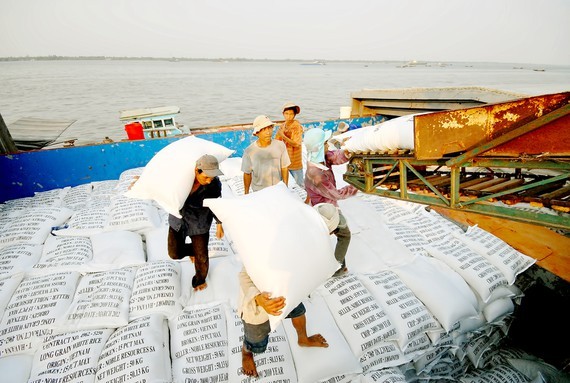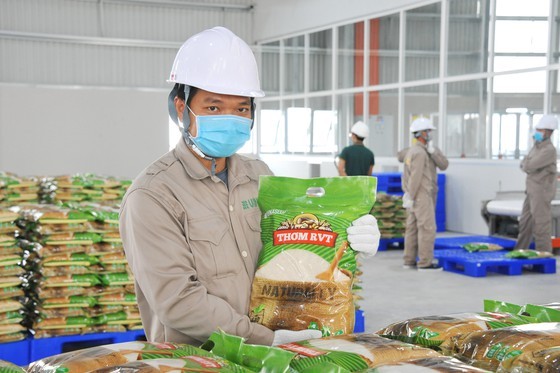 Enterprises in An Giang Province buy high-quality rice for export. (Photo: SGGP)
Enterprises in An Giang Province buy high-quality rice for export. (Photo: SGGP)
In the first days of August, the Mekong Delta provinces have massively harvested summer-autumn rice. However, farmers have encountered many difficulties when they need to sell paddy in the context that many localities are applying social distancing to prevent the Covid-19 pandemic. Rice consumption has become a hot topic, especially when the Ministry of Agriculture and Rural Development (MARD) proposes to purchase and temporarily store rice to help farmers consume paddy and stimulate production.
Anxiously waiting to sell paddy
In An Giang Province, some farmers have agreed to lower paddy prices, but traders still abandon the deposits and do not return. “Currently, rice exporting enterprises are also facing difficulties in consumption, and the export prices of rice have decreased. The fact that enterprises limit rice purchases makes traders have no source of consumption, so they do not buy rice from farmers," said the director of a rice exporting enterprise in the Mekong Delta. The paddy prices in many places decreased to VND4,500-VND5,500 per kilogram, down VND500-VND1,500 per kg compared to the winter-spring rice crop.
According to the MARD, Mekong Delta farmers have harvested over 600,000 hectares of summer-autumn rice, while about 900,000 hectares will be harvested in August and September this year. In a recent online meeting, Deputy Minister of Agriculture and Rural Development Tran Thanh Nam could not hide his concern about the situation that farmers harvest rice, but there are no traders to buy it, and how rice will be stored. This is a problem that needs resolving quickly. Therefore, the ministry suggested that the Government allow the purchase and temporarily stockpile of paddy to stimulate production, encourage farmers to continue farming, and ensure the plan for the next crops.
Statistics show that there are still 900,000 hectares of rice in the Mekong Delta under harvest, with an estimated output of about 5 million tons of paddy, equivalent to 2.2 million tons of rice. “The proposal of the MARD to buy paddy for temporary stockpiling is appropriate amid the current context. However, I am a bit confused about how to make it effective," said Mr. Pham Thai Binh, CEO of Trung An High-tech Agriculture Joint Stock Company.
According to Mr. Pham Thai Binh, it is essential to pay attention to some issues when purchasing paddy through the national reserve channel, including the regulation that enterprises must bid for procurement packages following regulations of the Ministry of Finance. However, amid social distancing, it is hard to participate in bidding.
Anxiously waiting to sell paddy
In An Giang Province, some farmers have agreed to lower paddy prices, but traders still abandon the deposits and do not return. “Currently, rice exporting enterprises are also facing difficulties in consumption, and the export prices of rice have decreased. The fact that enterprises limit rice purchases makes traders have no source of consumption, so they do not buy rice from farmers," said the director of a rice exporting enterprise in the Mekong Delta. The paddy prices in many places decreased to VND4,500-VND5,500 per kilogram, down VND500-VND1,500 per kg compared to the winter-spring rice crop.
According to the MARD, Mekong Delta farmers have harvested over 600,000 hectares of summer-autumn rice, while about 900,000 hectares will be harvested in August and September this year. In a recent online meeting, Deputy Minister of Agriculture and Rural Development Tran Thanh Nam could not hide his concern about the situation that farmers harvest rice, but there are no traders to buy it, and how rice will be stored. This is a problem that needs resolving quickly. Therefore, the ministry suggested that the Government allow the purchase and temporarily stockpile of paddy to stimulate production, encourage farmers to continue farming, and ensure the plan for the next crops.
Statistics show that there are still 900,000 hectares of rice in the Mekong Delta under harvest, with an estimated output of about 5 million tons of paddy, equivalent to 2.2 million tons of rice. “The proposal of the MARD to buy paddy for temporary stockpiling is appropriate amid the current context. However, I am a bit confused about how to make it effective," said Mr. Pham Thai Binh, CEO of Trung An High-tech Agriculture Joint Stock Company.
According to Mr. Pham Thai Binh, it is essential to pay attention to some issues when purchasing paddy through the national reserve channel, including the regulation that enterprises must bid for procurement packages following regulations of the Ministry of Finance. However, amid social distancing, it is hard to participate in bidding.
 Packing high quality rice for export at Vinarice Factory in Dong Thap Province. (Photo: SGGP)
Packing high quality rice for export at Vinarice Factory in Dong Thap Province. (Photo: SGGP)
Enterprises's difficulties to participate in buying paddy from farmers In the context of the complicated development of the Covid-19 pandemic, Vietnam's rice exports made an impression in 2020 and the first months of this year. The quality of Vietnamese rice has been recognized positively by many countries. There was a time when the export price of Vietnamese rice approached that of Thai rice. However, over the past time, some activities lack transparency in rice import and export. According to some rice experts, the current price decrease and congestion of summer-autumn rice are the resonance of many reasons. The fact that domestic enterprises imported rice from Cambodia and India in the past time is said to be the same as bringing sand to the beach. Prof. Dr. Vo Tong Xuan, Rector of Nam Can Tho University, analyzed that it was difficult for enterprises to buy paddy as high as the winter-spring crop because India was releasing its rice reserves, following the cycle of selling old rice to buy new rice into the warehouse. Therefore, the plan to purchase rice for temporary storage in the current context is necessary. However, it is essential to focus on helping farmers in production cooperatives temporarily store rice. Accordingly, the State or enterprises advance farmers in cooperatives who have just harvested paddy a part of the money so that they can stockpile paddy at home but still have money to cover essential expenses. Or enterprises can buy paddy for temporary storage and advance farmers a part of the money and pay the rest when exporting rice. At present, a feasible countermeasure is to let rice exporters participate in buying paddy from farmers to reserve and wait for the right time to export. Basically, export enterprises hardly use the annual bank loan limits to purchase paddy for stockpiling because they have already bought paddy. Therefore, the Government needs to direct the banking system to handle capital for enterprises to collect paddy from farmers for temporary storage. Enterprises are solely responsible for profits and losses in trading," said Mr. Pham Thai Binh. Along with temporary storage, rice exporters in the Mekong Delta said that local authorities and relevant sectors need to create more favorable conditions for traders to move and purchase paddy for farmers.
Professionally labeling and packaging rice bags
According to some enterprises, most of Vietnam's rice in bags of 5-10 kilograms has not entered supermarkets in Europe and the US because it has not met the quality requirements of these markets. Rice packed in 5, 10, 50, and 100-kilogram bags are mainly consumed by Asian populations. Small bags of rice are being sold to foreign traders under their packaging, but the quantity is not much.
Another difficulty is that Vietnamese enterprises do not have representative offices and stores in major markets. It is difficult to build brands, packaging, and labels for Vietnamese enterprises in the EU and US markets. Initially, enterprises have to negotiate with supermarkets in importing countries to put their goods up for sale. After being put on the shelves, supermarkets immediately promote Vietnamese rice products to assess the quality. However, that is how foreign supermarkets survey for buyer satisfaction. If sales increase and consumers accept the product, supermarkets will discuss with Vietnamese enterprises about packaging and labeling under supermarkets’ brands, but rice is still of Vietnamese enterprises. It is difficult for enterprises to sell rice when they pack rice for supermarkets because supermarkets can lower prices to compete. Therefore, the fact that Vietnamese enterprises only process and pack rice under the labels of imported enterprises is still a stable plan.
Nguyen Trung Kien, General Secretary of the Vietnam Food Association, analyzed that to export high-quality rice to fastidious markets, farmers need to ensure standards when cultivating rice, improve quality, limit the use of chemical fertilizers, and use microbial fertilizers instead. To ensure stable rice quality, enterprises need to associate with cooperatives in production areas to minimize intermediaries, reduce production costs, and increase competitiveness.
According to some enterprises, most of Vietnam's rice in bags of 5-10 kilograms has not entered supermarkets in Europe and the US because it has not met the quality requirements of these markets. Rice packed in 5, 10, 50, and 100-kilogram bags are mainly consumed by Asian populations. Small bags of rice are being sold to foreign traders under their packaging, but the quantity is not much.
Another difficulty is that Vietnamese enterprises do not have representative offices and stores in major markets. It is difficult to build brands, packaging, and labels for Vietnamese enterprises in the EU and US markets. Initially, enterprises have to negotiate with supermarkets in importing countries to put their goods up for sale. After being put on the shelves, supermarkets immediately promote Vietnamese rice products to assess the quality. However, that is how foreign supermarkets survey for buyer satisfaction. If sales increase and consumers accept the product, supermarkets will discuss with Vietnamese enterprises about packaging and labeling under supermarkets’ brands, but rice is still of Vietnamese enterprises. It is difficult for enterprises to sell rice when they pack rice for supermarkets because supermarkets can lower prices to compete. Therefore, the fact that Vietnamese enterprises only process and pack rice under the labels of imported enterprises is still a stable plan.
Nguyen Trung Kien, General Secretary of the Vietnam Food Association, analyzed that to export high-quality rice to fastidious markets, farmers need to ensure standards when cultivating rice, improve quality, limit the use of chemical fertilizers, and use microbial fertilizers instead. To ensure stable rice quality, enterprises need to associate with cooperatives in production areas to minimize intermediaries, reduce production costs, and increase competitiveness.
























